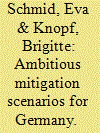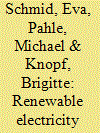| Srl | Item |
| 1 |
ID:
116985


|
|
|
|
|
| Publication |
2012.
|
| Summary/Abstract |
This paper addresses the challenge of engaging civil society stakeholders in the development process of ambitious mitigation scenarios that are based on formal energy system modeling, allowing for the explicit attachment of normative considerations to technology-focused mitigation options. It presents the definition and model results for a set of mitigation scenarios for Germany that achieve 85% CO2 emission reduction in 2050 relative to 1990. During consecutive dialogues, civil society stakeholders from the transport and electricity sector framed the definition of boundary conditions for the energy-economy model REMIND-D and evaluated the scenarios with regard to plausibility and social acceptance implications. Even though the limited scope of this research impedes inferential conclusions on the German energy transition as a whole, it demonstrates that the technological solutions to the mitigation problem proposed by the model give rise to significant societal and political implications that deem at least as challenging as the mere engineering aspects of innovative technologies. These insights underline the importance of comprehending mitigation of energy-related CO2 emissions as a socio-technical transition embedded in a political context.
|
|
|
|
|
|
|
|
|
|
|
|
|
|
|
|
| 2 |
ID:
125628


|
|
|
|
|
| Publication |
2013.
|
| Summary/Abstract |
German energy policy targets envision a share of electricity from renewable energy sources (RES-E) of at least 80% in 2050. How can the transformation of the German electricity sector be achieved and at what costs? This paper addresses these questions by means of a meta-analysis of 10 recent model-based mitigation scenarios for Germany. It turns out that the scenarios exploit the three basic strategic options of increasing the share of RES-E - domestic RES-E generation, electricity demand reductions, and RES-E imports - to substantially different extents. Domestic RES-E generation increases in all scenarios, particularly from onshore and offshore wind. Scenarios that rely heavily on reducing electricity demand require a relatively low expansion of domestic RES-E generation. Despite detailed technical analyses, insights on the costs of the transformation remain limited. A discussion of underlying scenario assumptions reveals that it is unclear whether (i) RES-E and system integration technology development will be as cost-competitive as postulated, (ii) implicitly assumed institutional requirements will be realized, and (iii) relevant actors in the transformation process will be incentivized accordingly. Therefore, future research should pursue a thorough assessment of strategic options for transforming the German electricity system that consistently integrates technologies, institutions, and actors.
|
|
|
|
|
|
|
|
|
|
|
|
|
|
|
|
| 3 |
ID:
109635


|
|
|
|
|
| Publication |
2011.
|
| Summary/Abstract |
The impacts of the availability of low-carbon technologies on the regional distribution of mitigation costs are analyzed in a global multi-regional integrated assessment model. Three effects on regional consumption losses are distinguished: domestic measures, trade of fossil energy carriers and trade of emission permits. Key results are: (i) GDP losses and a redirection of investments in the energy system towards capital-intensive technologies are major contributions to regional consumption losses. (ii) A devaluation of tradable fossil energy endowments contributes largely to the mitigation costs of fossil fuel exporters. (iii) In case of reduced availability of low-carbon technologies, the permit market volume and associated monetary redistributions increase. The results suggest that the availability of a broad portfolio of low-carbon technologies could facilitate negotiations on the permit allocation scheme in a global cap-and-trade system.
|
|
|
|
|
|
|
|
|
|
|
|
|
|
|
|